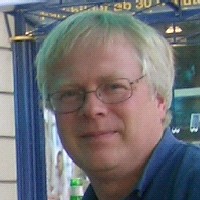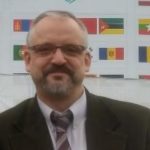-
Principal Investigator
 Professor John T S Irvine FRSE, FRSC has made a unique and world-leading contribution to the science of energy materials, especially fuel cell and energy conversion technologies. This research has ranged from detailed fundamental to strategic and applied science and has had major impact across academia, industry and government. Irvine’s science is highly interdisciplinary extending from Chemistry and Materials through physics, bioenergy, geoscience, engineering, economics and policy.
Professor John T S Irvine FRSE, FRSC has made a unique and world-leading contribution to the science of energy materials, especially fuel cell and energy conversion technologies. This research has ranged from detailed fundamental to strategic and applied science and has had major impact across academia, industry and government. Irvine’s science is highly interdisciplinary extending from Chemistry and Materials through physics, bioenergy, geoscience, engineering, economics and policy.
The quality and impact of Irvine’s research has been recognised by a number of national and international awards, including the Lord Kelvin Medal from the Royal Society of Edinburgh in 2018, the Schönbeim gold medal from the European Fuel Cell Forum in 2016, the RSC Sustainable Energy Award in 2015, with earlier RSC recognition via Materials Chemistry, Bacon and Beilby awards/medals. In 2021, John has been awarded the Royal Society Hughes Medal, which is awarded to the outstanding researcher in the field of energy.
Irvine has almost 600 publications and has an WoS h-index of 64. He has strong international standing having held senior visiting appointments in the US, Australia and China and has strong links with a number of leading laboratories across the Chinese Academy of Science including being Thousand Talents professor at Fujian Institute of Research on the Structure of Matter.
-
Co-Investigators
 Professor Steve Lee FRSE, FInstP, has over 30 years of experience working in a very diverse range of advanced and functional materials, from liquid crystals and nanocolloids to quantum magnets and oxide superconductors. His career has involved both working in industry and having significant engagement with industry including SME’s and multinational laboratories. His work is highly interdisciplinary and frequently involves working with chemists and materials scientists. He has particular interest in the application of large-scale facilities to quantum materials and functional materials, including the use of neutron, muon and synchrotron sources. He has 145 publications with a WoS h-index of 33 (ca. 3900 citations). Current funding includes being PI on a £1.9M EPSRC funded strategic equipment grant that currently underpins a wide range of research, including the magnetic characterisation of exsolved nanomaterials through SQUID magnetometry measurements.
Professor Steve Lee FRSE, FInstP, has over 30 years of experience working in a very diverse range of advanced and functional materials, from liquid crystals and nanocolloids to quantum magnets and oxide superconductors. His career has involved both working in industry and having significant engagement with industry including SME’s and multinational laboratories. His work is highly interdisciplinary and frequently involves working with chemists and materials scientists. He has particular interest in the application of large-scale facilities to quantum materials and functional materials, including the use of neutron, muon and synchrotron sources. He has 145 publications with a WoS h-index of 33 (ca. 3900 citations). Current funding includes being PI on a £1.9M EPSRC funded strategic equipment grant that currently underpins a wide range of research, including the magnetic characterisation of exsolved nanomaterials through SQUID magnetometry measurements.
 Dr. Paul Connor is a Senior Research Fellow and Lecturer in the School of Chemistry at St Andrews. His work focuses on the physical aspects and bridging engineering of SOFC, reversible fuel cell and electrolyser technology. This work has generated over 20 refereed papers and two patents. He is a co-founder of St Andrews Fuel Cells Ltd. He has been working on Fuel Cells since 2001, after finishing a 3 year fellowship researching negative electrodes for rechargeable lithium ion batteries, also at St Andrews. His PhD was awarded in 1998 from the University of Otago (New Zealand) for studies of the metal oxide-water interface relating to photoelectrochemical systems.
Dr. Paul Connor is a Senior Research Fellow and Lecturer in the School of Chemistry at St Andrews. His work focuses on the physical aspects and bridging engineering of SOFC, reversible fuel cell and electrolyser technology. This work has generated over 20 refereed papers and two patents. He is a co-founder of St Andrews Fuel Cells Ltd. He has been working on Fuel Cells since 2001, after finishing a 3 year fellowship researching negative electrodes for rechargeable lithium ion batteries, also at St Andrews. His PhD was awarded in 1998 from the University of Otago (New Zealand) for studies of the metal oxide-water interface relating to photoelectrochemical systems.
 Dr. Cristian-Daniel Savaniu, MRSC is a Senior Research Fellow in the School of Chemistry at the University of St Andrews and his work focuses on the development of advanced materials with applications in catalysis, batteries and fuel cells. He has a keen interest in developing new materials and structures, focusing on the materials synthesis and processing aspects such as solution methods and thin film deposition techniques. He has been a PI or Co-I in several EPSRC and European projects and has co-authored over 30 refereed papers (h-index 15), 3 book chapters and 2 patents.
Dr. Cristian-Daniel Savaniu, MRSC is a Senior Research Fellow in the School of Chemistry at the University of St Andrews and his work focuses on the development of advanced materials with applications in catalysis, batteries and fuel cells. He has a keen interest in developing new materials and structures, focusing on the materials synthesis and processing aspects such as solution methods and thin film deposition techniques. He has been a PI or Co-I in several EPSRC and European projects and has co-authored over 30 refereed papers (h-index 15), 3 book chapters and 2 patents.
